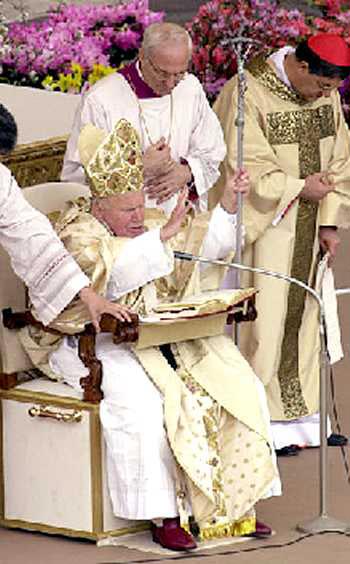He also touched upon other conflicts, including Israeli-Palestinian fighting that is now in its 30th month. "(May there be) peace in other parts of the world, where forgotten wars and protracted hostilities are causing deaths and injuries amid silence and neglect on the part of considerable sectors of public opinion," John Paul said. "With profound grief I think of the wake of violence and bloodshed, with no sign of ceasing, in the Holy Land," the pontiff said. He also said some African countries risked being abandoned, and he cited "attacks on people's freedom in the Caucasus, in Asia and in Latin America." For the world's 1 billion Catholics and other Christians, Easter marks the day that Jesus rose from the dead after crucifixion. At the start of the Mass earlier Sunday, John Paul took his place on the steps of the basilica after only a few hours of rest after presiding over a three-hour-long Easter vigil ceremony in the basilica. He looked pale and weary, at one point yawning and cradling his head in his hands. The Sunday morning Mass capped a strenuous Holy Week schedule of ceremonies for the 82-year-old pontiff, who, struggling with symptoms of Parkinson's disease, has difficulty in walking and reading long speeches. During the Good Friday procession at Rome's Colosseum, Iraqis were among the faithful chosen to carry the cross for the pope, who no longer can walk the half-mile route. Under gray skies, the square was brightened by potted plants, including deep pink azaleas, a rainbow of tulips and sprays of lilac-hued wisteria. To help the pope as his health problems have worsened over the past years, the Vatican has come up with a variety of devices to ease his getting around. The latest is a wheeled chair that can be raised and lowered and lets the pope celebrate Mass at the altar without standing up. He also now sits in a kind of wheeled chariot while being moved across the vast expanses of the basilica or the square. Until recently, he used to stand up in the device. During the first years of his papacy, which began in 1978, John Paul delivered his "Urbi et Orbi" message from the basilica's central balcony. This year he remained seated at the altar while he spoke. He kept up his tradition of reciting Easter greetings in dozens of languages, this year wishing a joyful day in 62 tongues. |
